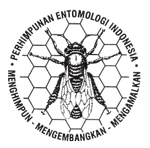Aktivitas nokturnal vektor demam berdarah dengue di beberapa daerah di Indonesia
DOI:
https://doi.org/10.5994/jei.9.1.1Keywords:
Aedes aegypti, Aedes albopictus, nocturnal biting activityAbstract
The continous presence of dengue virus infection presents a serious health problem in many tropical areas of the world because of the severe and often fatal disease in children. Dengue viruses are transmitted to human through the biting of infected mosquitoes, especially Aedes aegypti and Aedes albopictus. This paper reported the nocturnal of biting activity of Ae. aegypti and Ae. albopictus in several areas of Indonesia. Natural population of Aedes was collected by bare leg collection and resting collection from 18:00 to 06:00 out door and indoor. The biting activities of Ae. aegypti and Ae. albopictus occurred throughout the night from 18:00 to 05:50 out door and indoor in Cikarawang, Babakan, and Cibanteng Kabupaten Bogor (2004); Cangkurawuk Darmaga Bogor (2005, 2007); Pramuka island, Pari island, Kepulauan Seribu (2008); Gunung Bugis, Gunung Karang, Gunung Utara Balikpapan (2009); and Kayangan, Lombok Utara (2009). These results showed that the biting activities of Ae. aegypti dan Ae. albopictus did not only occur diurnally but also nocturnally.Downloads
Download data is not yet available.
Downloads
Published
2015-09-25
How to Cite
Hadi, U. K., Soviana, S., & Gunandini, D. D. (2015). Aktivitas nokturnal vektor demam berdarah dengue di beberapa daerah di Indonesia. Jurnal Entomologi Indonesia, 9(1), 1. https://doi.org/10.5994/jei.9.1.1
Issue
Section
Articles
License
Authors who publish with this journal agree to the following terms:
- Authors retain copyright and grant the journal right of first publication with the work simultaneously licensed under a Creative Commons Attribution 4.0 International License that allows others to share the work with an acknowledgement of the work's authorship and initial publication in this journal.
- Authors are able to enter into separate, additional contractual arrangements for the non-exclusive distribution of the journal's published version of the work (e.g., post it to an institutional repository or publish it in a book), with an acknowledgement of its initial publication in this journal.
- Authors are permitted and encouraged to post their work online (e.g., in institutional repositories or on their website) prior to and during the submission process, as it can lead to productive exchanges, as well as earlier and greater citation of published work (See The Effect of Open Access).








